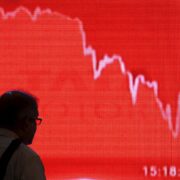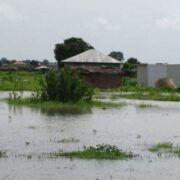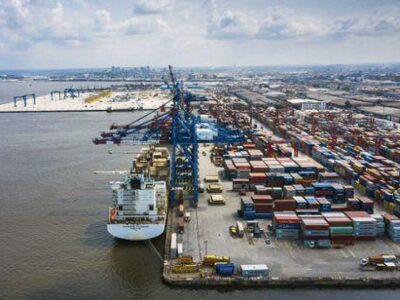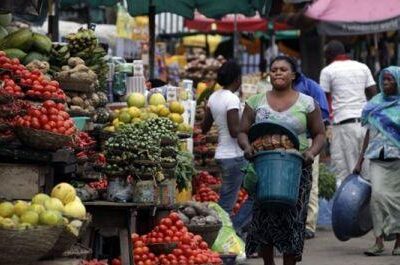
For many Nigerians, 2024 was a year of struggle. The country’s inflation rate surged for the third consecutive month in November to reach 34.6%, the highest level in over 28 years, according to data from the statistics agency.
The inflation has been exacerbated by recent floods in the country’s northern regions, which have caused prices of staple foods like yam, corn, and rice to soar. Rising gasoline costs have also contributed to the price pressures in Africa’s largest crude oil exporter.
President Bola Tinubu’s decision to allow the naira to devalue and cut fuel subsidies in a bid to boost economic growth have been likened to bitter medicine for an economy long in need of reform.
In an exclusive interview, finance minister Wale Edun, who has coordinated the reforms since assuming his position in August 2023, tells African Business why he thinks that the economy is about to turn the corner – and why sticking the course will allow Nigeria to reap the rewards in 2025 and beyond.
After a challenging year, you are tasked with stabilising and revitalising the economy. Following the reforms your administration has introduced, are you optimistic about Nigeria’s economic trajectory in 2025?
Without any doubt, I am very optimistic about our nation’s economic trajectory, not only in 2025 but beyond. In the year ahead we expect to see an acceleration of economic growth coupled with a reduction in the rate of increase of prices. These expectations are reflected in the Medium Term Expenditure Framework and the Fiscal Strategy Paper approved by the legislature. It is noteworthy that we are not the only ones who have this expectation. Projections provided by the International Monetary Fund (IMF), the World Bank and other forecasters agree that growth will improve and inflation will slow. In 2025, the issues around economic stability will be largely resolved
Perhaps the biggest issue with stabilising our economy is to reduce inflation and keep it low. We are clear that very significant progress will be achieved in this regard in the months ahead. If nothing else, we expect the downward path of fuel prices, a major element in stoking higher prices, to continue. The current downward trend results from the combination of enhanced domestic refining capacity provided by the Dangote refinery, stable exchange rate, and our policy to sell crude oil to domestic refiners in naira. These have all contributed to the turnaround in fuel prices. We expect to see further reductions in the year ahead as the combination of factors above is further strengthened by additional refining capacity from government-owned refineries and the BUA Group becoming effective. We also expect a significantly slower increase in food prices to contribute to lower inflation.
The reforms, as we have always contended, were inevitable if we are to unlock the potentials of this country and make the growth and development progress we need. The challenge with reforms of this nature is that the costs must be borne before the benefits manifest. Our biggest and ongoing challenge in this regard lies in ensuring adequate protection for vulnerable fellow Nigerians. Though now improving, this has been an uphill task – made more onerous by the absence of a universally acceptable database. We are however now finding resolution to the various issues that have dogged the acceptance of the database of vulnerable Nigerians. Our direct benefit transfers have now reached approximately 20m Nigerians. We expect to make even more rapid progress in these disbursements in Q1 2025. Based on these, I am confident not only about maintaining our trajectory but that we are working to improve the outcomes and ensure the quality of life of every Nigerian is seen to improve noticeably.
Investors remain focused on transparency and predictability. There has been some debate regarding Nigeria’s foreign exchange reserves, reported to be around $40bn – levels last seen in the late 2010s. Could you shed more light on this?
Building trust capital is fundamental to restoring the confidence of all stakeholders – domestic or foreign. Before dealing with the issue of foreign exchange reserves, it is important to draw attention to some of the measures taken to ensure transparency and predictability: deploying technology towards eliminating leakages and opaqueness in government financial transactions. We have seen a significant reduction in leakages.
Beyond the fiscal arrangements, the Central Bank of Nigeria (CBN) has sharply improved on its regulatory work to enable confidence in all facets of our financial architecture. Recently it introduced the Bloomberg Electronic Foreign Exchange Matching System to ensure efficient price discovery. This system enables a credible and transparent process in that market that will help anchor stakeholder expectations and thus enhance market predictability. This follows a long line of other financial market reforms which commenced with the unification of various existing exchange rate windows in June last year.
Foreign reserves stood at $42bn on 14 December. While this is an area for CBN commentary, I am happy to see the steady improvement in our reserves. This is perhaps not surprising given that the surplus on our current account balance has continued to improve with portfolio investor inflows and remittances. It is noteworthy that the reserves have continued to grow in a year when, until recently, payment of fuel subsidies meant that the CBN was not a direct beneficiary of proceeds from crude oil exports. It is important to state that our expectation of improvements in crude oil production will improve the availability of foreign exchange to the economy. It is also important to draw attention to the emerging oil refining sector of our economy and its potential for improving both domestic value addition and also generating export income for our nation.
Your administration has implemented long-awaited reforms, including the removal of fuel subsidies. While these measures were tough, are you now beginning to see tangible benefits for the economy?
Without doubt the benefits are beginning to manifest. We are seeing green shoots that give us hope for further and significant movements along our chosen direction of travel. My responses to earlier questions already provide a sense of some of the improvements.
To be clear, notwithstanding the reform measures, the economy in Nigeria did not at any time stop growing. I have seen some comments which characterised the economy as being in recession. This is totally incorrect. The latest data for output growth show the economy grew by just under 3.5% between July and September 2024. Between January and September it grew at an average 3.23%. Furthermore, since the Tinubu administration took office at the end of May 2023 the economy has consistently grown and this growth is broad-based. Data published by the Nigeria Bureau of Statistics for Q3 2024 shows that 97% of our economy continues to grow.
An area that has been of concern is our financial system – especially the market for foreign exchange. The new team at the CBN led by the Governor, Yemi Cardoso, has instituted a wide range of reform measures which have reversed the adverse impression about the safety and reliability of our financial system. Ensuring payment of “trapped” monies and settling outstanding debts, and various reforms of the foreign exchange market and its requirement for capital enhancement by banks, have resulted in greater confidence in our financial system. With the government staying strictly within the legal bounds in its use of borrowing from the Central Bank, the growth in liquidity has been curtailed. All of these have resulted in a more stable exchange rate.
In the energy sector, we continue to work towards improving availability and access to electricity and the production of oil and gas. We are seeing new investments which will go a long way towards enabling improved production. In December Shell Nigeria announced investment in the Bonga North Field. With other investments in the onshore segment by indigenous companies such as Renaissance Africa Energy, OANDO and SEPLAT, we are confident that our reform programme continues to make progress.
The legislature is presently considering a set of bills that will be transformational in their impact on the finances of government. What we have done thus far has resulted in government revenue as a share of national output rising to 13% in Q2 2024 compared to the average of 8% in previous years, reducing the government deficit and thus the proportion of resources devoted to debt service.
What is next on the government’s reform agenda, and what key lessons have you learned from the past 18 months?
In the immediate term we will concentrate on addressing our pain points around enabling protection for vulnerable citizens, sharply improving food supply, reducing costs, and supporting key sectors to grow even faster than they are presently doing.
As I have noted, we still have a way to go in reaching the most vulnerable in our society. The cash transfer programme has reached approximately one-third of the intended recipients. This is far from satisfactory. We have identified the issues and are working to ensure that all intended recipients are covered as soon as possible. Of course access to food is a major component of quality of life for our citizens. Even though the agricultural output is improving, with 1.1% growth between July and September 2024, this is too slow to enable us feed our citizens and our sub-regional compatriots. We are working to stimulate growth in the agriculture sector to increase beyond the rate of population increase.
It is also very important for us that output in the energy sector – oil and gas, and electricity – improves considerably. Nigeria has industrial ambitions and these cannot be realised without energy input. In my view, we need to consider various options for stimulating investment in the energy sector. Without an efficient and cost-competitive energy sector, we will be unable to get our manufacturing and processing sector into a position where it take advantage of the opportunities inherent in the African Continental Free Trade Agreement (AfCFTA). Work is under way on tax reforms: the Presidential Committee on Fiscal and Tax Reforms has already yielded a set of bills which are before the legislature. These tax reforms and the fiscal space they create will also enable more room for the effectiveness of monetary policy and thus improve the outcomes of fiscal-monetary policy coordination.
At the heart of our thinking around the next steps is to drive rapid, sustained, inclusive and sustainable growth in our economy. As a government, our aim as we begin to reflect on the successor to the current National Development Plan is to get output growth of 7% by 2027 while keeping inflation down, exchange rates stable and interest rates within limits that enable funding of organisations needing external capital. To do all these, we need to stimulate investment by domestic wealth holders in our economy.
The pain of reform, especially in the context of the significant trust deficit that we inherited, makes it difficult to implement. Trust, once lost, is difficult to regain. Obvious as this may be, it is even more difficult in the setting where politics makes consensus building very difficult.
With international banks scaling back operations in Africa and foreign direct investment slowing, how concerned are you about these trends? What steps is your administration taking to attract both domestic and foreign investments?
Any development that narrows access to capital, be it for government or non-government operators, is a source of concern. It is important to note that notwithstanding your comment about slowing foreign direct investment (FDI), data indicates that FDI growth exceeds export growth, with the gap projected to widen. This speaks eloquently to an important strategic option for capital-constrained economies.
One of the key outcomes of Covid-19 is the trend towards increasing regionalisation of supply chains. Producer nations are realising the importance of being situated closer to markets and thus investing in the creation of hubs to serve a collection of markets. For me, the importance of this is that Nigeria must in some respects improve its attractiveness to investment. I deliberately speak of investment, as opposed to foreign investment. It is important that the economic environment becomes such that domestic wealth holders find the home arena more attractive. Failure in this regard will lead to capital flight, pressures on the exchange rate and further disruption to the economy. We must ensure that we keep inflation down. Without this, our ability to effectively hold our domestic markets and compete in foreign markets is imperilled. Furthermore, a high rate of increase in prices undermines domestic investor willingness to hold assets – especially financial assets – in our currency. The resulting adoption of other currencies (in our case, the US dollar) makes the management of domestic monetary policy more difficult.
To be attractive to investment, the quality and quantity of our labour force must be such as to enable cost-effective production. In this regard, the ongoing work around the curriculum in the education sector is very important. The issues around the need for regulatory certainty cannot be overlooked. The making and enforcement of rules and regulations cannot be arbitrary without damaging our national interest. I do not underestimate the importance of security – both at our borders and in domestic law and order.
The issues I have referred to are all being worked on, in initiatives spread across the government. Our insistence on executing the reform measures we have is the first example of our recognition that without reforms, the status quo would leave our economy unattractive and in danger. Secondly, working to ensure that yields on assets, net of inflation, are positive represents a clear understanding that we cannot endanger the resources of indigenous wealth holders without further damage to the economy. Thirdly, we have restructured the Ministry of Finance Incorporated (MoFI) as part of an effort to better manage the national balance sheet by identifying assets and enabling these to be more aggressively managed in the national interest.
In this vein, work is ongoing to streamline the public agencies responsible for managing public assets, namely the Infrastructure Concession and Regulatory Commission (ICRC), the Bureau of Public Enterprises (BPE) and MoFI.
How critical is it to support national champions like the Dangote Group to drive Nigeria’s industrial transformation and reduce import dependency?
We are clear about the importance of being able to produce for the domestic and international markets. We will be unable to benefit from the opportunities inherent in the AfCFTA if we cannot produce competitively. Indeed, one of the trends in the Nigerian economy that we must work to improve is the almost stagnant contribution of our processing sectors to our national output. We need the processing sectors – manufacturing, construction, utilities – to raise their contribution to the national economy, perhaps at a minimum to double the current levels.
I do sometimes wonder whether we are import dependent. What is the benchmark for classifying a nation as import dependent? With imports at less than 20% of national output, we compare favourably with sub-regional and continental peers. Some African countries have import levels as high as half their national output. I concede that we are not transforming our imports into exports. This underscores the importance of national champions; but the appropriate agencies must ensure that dominance of domestic markets is not to our national disadvantage.
How significantly is the Dangote refinery contributing to improve Nigeria’s current account balance and overall balance of payments?
The Dangote Group plays in major sectors of the economy, among other leading manufacturers. Improving the manufacturing sector is a major focus of this administration, to moderate manufactured goods imports and improve the current account balance for reserves accretion. Dangote Group has commenced petroleum motor spirit production, with 650,000 barrels capacity. This will be complemented by the BUA Group refinery with 250,000 barrels capacity that will come on stream soon. These developments take a major demand pressure off foreign exchange. Thus, the increased domestic refining capacity, coupled with other manufacturing activities, will help to moderate importation, improving our current account balance and the balance of payments.
During your recent Eurobond roadshow what feedback did you receive from investors regarding Nigeria’s economic direction and investment opportunities?
The oversubscription of our latest Eurobond at $9.1bn (instead of $2.2bn) indicates our successful return to the global market and showcases Nigeria as a profitable investment destination. Note that the Russia-Ukraine war occasioned global contractionary monetary policy to combat global inflation, and this moderated the attractiveness of developing economies’ Eurobonds in the global market.
It further signals improved confidence in the President’s economic strategy; improved confidence in the economy generally; confidence in the debt repayment capacity of the economy; and that the presidential investment targets directive to ministries, departments and agencies, with the expected improvement in the growth trajectory of the economy, will help investment opportunities and reduce risks.
Looking ahead, what are your key priorities, and why should investors remain confident in Nigeria?
My priorities remain bringing down inflation while significantly growing the economy, with a strong social protection regime in place. The US fought inflation with high interest rates, yet grew the economy with investment funded by savings not debt. We aim to do likewise.
Investors have already signalled confidence by subscribing to our debt instruments. Both the recent Eurobond issue and the earlier domestic issuance of US dollar denominated bonds were over-subscribed. Going forward, our agenda is to enable a stable, rapidly growing, inclusive and sustainable economy. This will most certainly enable investors, especially long-term investors, to realise their aspirations. All Nigerians and those resident in Nigeria will experience an uplift in quality of life.
Nigeria has ambitious infrastructure plans, including major gas pipeline projects to Europe via Morocco and Algeria. What are the government’s broader plans?
The infrastructure stock as a share of GDP is currently 35%; the ambitious investment plan is to move toward 75%, as this is necessary to unlock our potential for sustained productivity.
Thus, the administration is committed to the completion of these ambitious projects and to renew momentum for them to move forward in 2025.
Plans for infrastructure investment are guided by the Revised National Integrated Infrastructure Master Plan (NIIMP). The financing arrangement cuts across debt, equity and public-private partnerships.









Comments